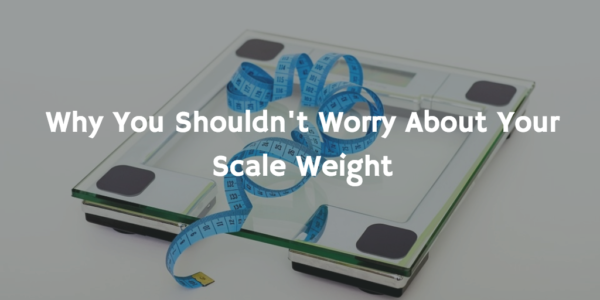Near the end of last year, when my wife and I found out we were expecting, we had to schedule our first of many doctors appointments to check up on our baby girl. When we went to the appointment, Candice had to get some tests done before we could meet with the doctor. Things like heart rate, blood pressure, and weight.
The funny thing was, after the nurse checked her scale weight, she asked me to jump on the scale as well. She said they always have the spouse weigh in to see if they gain any sympathy weight during the pregnancy. Apparently this is pretty common.
I happily agreed and have been doing it at each appointment over the past 5-6 months. I eat pretty similar each week so my weight has stayed almost the exact same each time.
The last time was a little different though. Candice had her appointment scheduled for the Monday following Easter Sunday. We always have a big family get together at my sister-in-law’s house and this year was no different.
We had a big meal prepared and I certainly ate more food than I typically do over a weekend. Some good, some not so good. I indulged a little and had some crackers, cookies, and a cupcake or two.
Not only that, but the appointment was scheduled at 12:15pm and I had literally eaten lunch 20 minutes prior to that. You probably see where I’m going with this.
So, I got on the scale and low and behold I was five pounds heavier than I was 3 weeks ago when they previously weighed me. The nurse couldn’t believe I had put on five pounds!
When you’re trying to lose body fat, there’s nothing more frustrating than the scale. It can show a loss one day and an increase the next. It’s enough to drive anyone with a weight loss goal crazy.
When this happens with a client, I’m always quick to point out that the most important thing to do is not to worry. I wasn’t worried one bit when I saw that five pound jump.
You see, there are a lot of factors that go into the number you see on the scale. It doesn’t just look at the amount of fat you have. That’s why it’s always important to take the number with a grain of salt. And in this article, I want to detail of few of the things that can affect your weight.
Let’s get started!
1. Being Hydrated
The urinary system is responsible for keeping the water and electrolyte balance in your body. This system can only process so much water at one time. When you drink a lot of water in one sitting, some of that water isn’t able to be filtered through.
When this occurs, the extra water is left over to be processed later. This will show up immediately on the scale. If you drank a lot of water and check your weight soon after, you’ll most likely see an increase.
2. Carbohydrates
When you eat carbohydrates, your body stores them as glycogen which you can then use for energy. Your body has the ability to store upwards of 500 grams of carbs. With each gram of carbohydrate that you eat, your body also stores between 3-4 grams of water.
And as you read above, holding more water will ultimately result in a larger number when you jump on the scale. So, if you ate at an Italian restaurant and chowed down on pasta and breadsticks one night, expect to be a few pounds heavier the next morning.
3. Salt
This one is pretty similar to the way carbohydrates can affect the scale. Our bodies maintain a balance between sodium and water. When you eat more salt, your body naturally retains more water to keep that perfect balance.
And once again, this will be reflected when you weigh yourself. If you have a meal out at your favorite Mexican restaurant and have a little too much chips and salsa, don’t be surprised if you’ve added a couple of pounds the next day.
4. Stress
Stress, by itself, won’t actually put weight on you. It’s the side effects from being stressed. When we’re stressed, our bodies increase the hormones responsible for appetite. Not only that, our cravings increase too.
When you’re stressed it’s always hard to stay away from high carb and high salty foods. This is what most crave when they’re having a tough day. And as you learned above, you’ll retain more water when you eat foods like this, resulting in a heavier you.
5. Undigested Food
This one is a less complicated than the previous ones. All foods have a particular weight. If you fill your stomach with a food, you are adding extra weight to your body. This is why it’s not the best idea to weigh yourself right after you’ve eaten.
So, why wasn’t I worried when I gained those extra five pounds? Well, I knew it had to do with eating more carbohydrates and salt than normal over a holiday weekend and having eaten right before.
The very next day, on Tuesday, I weighed myself and had already dropped four of those five pounds. On Wednesday, I weighed myself again, and I was back to my normal weight.
I didn’t magically lose five pounds in two days. I was simply retaining more water and had food in my stomach that gave the appearance of an increase in weight.
Wrapping Up
The scale can be very fickle when trying to lose body fat. Just remember, there a multiple things that can affect the results you see. Don’t get discouraged when you see a bump up. It doesn’t always mean that you’ve gained weight.
There are other methods that you can use to determine if your losing fat like photos, circumference measurements, and how your clothes are fitting. The scale is just one tool you can use. Be sure not to base your level of progress solely on it. If you do, you’ll never be satisfied with the results. The most important thing is that you feel good about what you’re doing and the results you’ve made.






